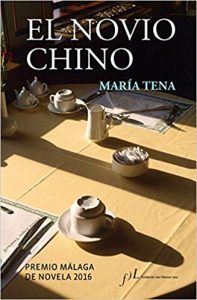When sensitivity addresses the human in literature, you can always enjoy a full literature. Maria Tena He writes so that each sentence resonates on the skin, with that atavistic cellular memory that makes of the experiences of the human around love, lack of love, absence or happiness, replicas in search of the most accurate explanation in words.
In a certain way, making the nostalgic reading of Maria Dueñas and the intensity of Almudena Grandes, María Tena crystallizes in her characters that humanity that sprouts mainly in the intra-vital histories that make up the destinations. Knowing the characters of Maria is to delve into the ultimate motives for everyone, in those half-truths that are exposed as the basis of any decision, of any vital change.
And that's where the surprises come, and the mimicry from empathy. Because behind the excuses are the certainties; Under the lattice of the present of the inhabitants of its pages, we approach to contemplate that past that justifies everything, like the great mystery that marks the path of every character in his own life story.
María Tena appears in the literary world with less cadence than your readers would like. But in each of his novels he enjoys that real motivation above the consideration of the job of writing, that impulse for writing as a necessity that ends up spreading in a fascinating truth.
Top 3 recommended novels by María Tena
Nothing you don't know
It is curious how sometimes starting to write a novel points to an internal motivation towards sublimation or even literary exorcism. And yet, the time to start writing about oneself is when one has already done previous exercises.
The arrival of Nada que no sepas was that exercise almost of confession by the author, of exposing the woman that was when the wickers of the personality began to intertwine with their knots between the smoothness of the new fiber. Revisiting childhood or adolescence is always an exercise in authenticity and melancholy.
What is abandoned by the imperative awakens guilt and nostalgia. But at the end of the day we know that we never stop being who we were. Since her years in Uruguay, María Tena combines what was and what was not, what could have happened and what was not.
But, anyway, the transparency in the description of the characters, the verisimilitude of the whole and the magic of its characters make this story a reunion not only with the childhood of the protagonist but also with our little paradise of youth.
Chinese groom
One of those stories that bewilder or fascinate, depending on the predisposition of the reader on duty. Thinking about a homosexual relationship in China sounds like a challenge, a vindication in the hearts of places that even today, despite official acceptance, weigh moral taboos against this free love.
Bruno and John have that accidental encounter where sparks fly. Shanghai supports them for this approach of Bruno, a guy who arrives as an institutional representative from Spain in an Expo and John, escaped from his life in deep China. Loneliness is as sad as it is magnetic for the souls that inhabit it.
And remote spaces are always favorable places to fortify casual encounters. Bruno and John begin to share their time in that casual limbo of the journeys undertaken that places them among complete strangers.
The therapeutic aspects of newly started relationships end up breaking towards a truth and a passion that runs through everything, from the depths of the soul to the buried drives, always between confessions that place both characters light years away from all those worldly beings that occupy their lives. everyday while they enjoy a time that may disappear in a matter of days.
The fragility of panthers
It is always curious how that shared reality is built from memories. Even more so in the case of family environments that in the end hide more than they communicate between table-hours and routine reunions.
For Itziar, Teresa or Laura, the same moment in their lives displays those traces of parallel realities on which lives and destinies unfold. Iñaki appears casually in today, at an abysmal distance from the childhood in which they all lived.
The kind memory of a familiar face gradually undermines the lives of the three sisters. In the magical composition of what was, presented in that mosaic of visions, we will discover how the foundations of what the three sisters are now can be subjected to the distress of their old desires, fears and the consequent current passions and renunciations.



